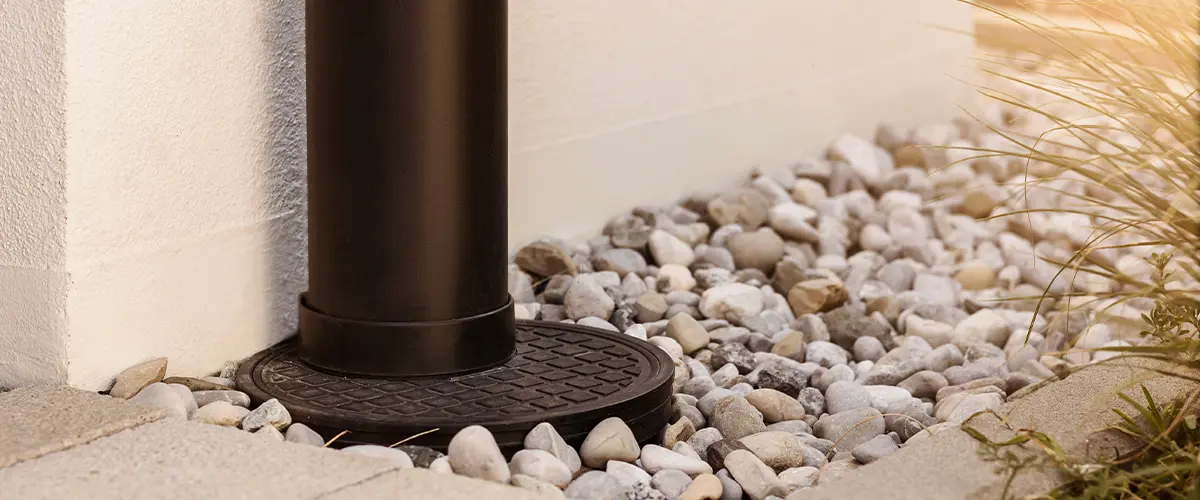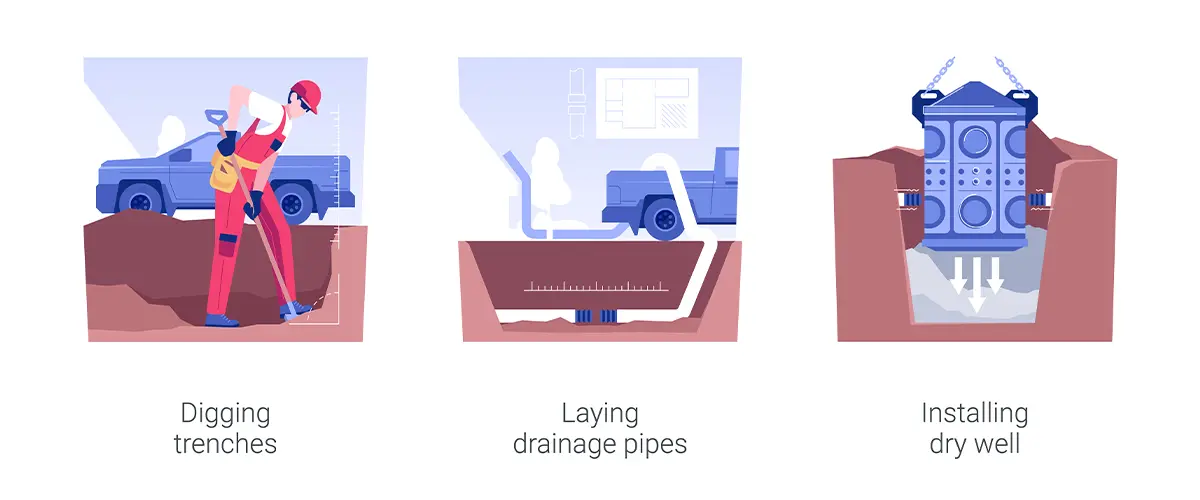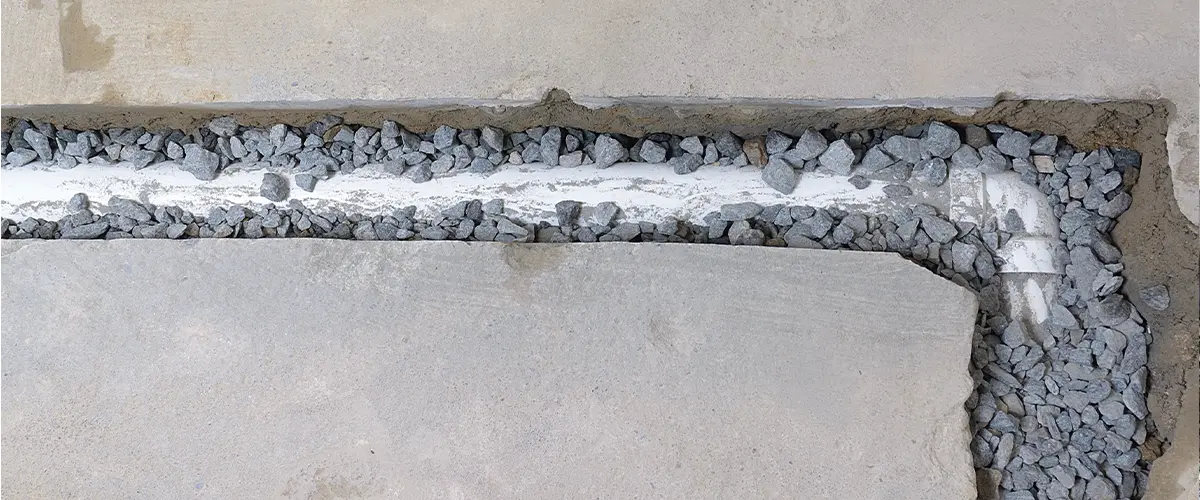Dry Well Vs French Drain In Hyattsville, MD
Are you dealing with standing water in your Hyattsville yard? A dry well or French drain could be the solution. This blog post compares these two systems, helping you choose the best for your home.
Keep reading to find out more!

Understanding Dry Wells and French Drains
Purpose and function
Dry wells and French drains serve to manage water in your yard. A dry well collects water from downspouts or sump pumps and lets it slowly soak into the ground, preventing it from pooling on the surface.
This keeps your basement dry and protects your foundation. On the other hand, French drains collect excess water with a perforated pipe buried in gravel, directing it away from your house to prevent flooding and soil erosion.
Both systems work by diverting water away from areas where it can cause damage. While dry wells handle large volumes of water from specific sources, French drains deal with surface and groundwater over larger areas.
Choosing between them depends on your property’s needs. Next up is how these solutions are installed in homes like yours.
Installation process
Installing a dry well or French drain in Hyattsville, MD, is a great choice for managing water runoff. Both systems offer efficient drainage solutions but involve different installation methods.
Here’s what to expect:
- Choose the right location: For a dry well, select a spot where water tends to accumulate. A French drain needs a trench that runs from the wet area to where you want the water redirected.
- Digging begins: Excavate a large hole for the dry well or a long trench for the French drain. The size depends on how much water you need to manage.
- Add gravel: For both systems, lay a layer of gravel at the bottom of your excavation. This helps with water absorption and redirection.
- Set up the dry well or drain pipe: Place your dry well tank into its hole or lay the drainage pipe along the trench for a French drain. Make sure everything is level.
- Cover with landscape fabric: This step is crucial to prevent dirt from clogging your system. Wrap the dry well or cover the trench (over the pipe) with fabric.
- Fill in with more gravel: Put additional gravel around and over the dry well tank or fill the trench above the landscape fabric and pipe.
- Backfill soil and restore grass: Cover everything with soil leaving just enough gap if necessary and replant grass or other plants to help blend everything back into your yard.
- Regular maintenance checks are essential to ensure efficiency, especially after heavy rains.

Factors to Consider When Choosing Between a Dry Well and a French Drain
Size and capacity
Dry wells and French drains handle different amounts of water. A dry well can store a large volume of water underground. This makes it perfect for areas with heavy rain. It slowly releases the water back into the ground, preventing floods.
On the other hand, a French drain moves water away from your home immediately. It works best in areas that need to keep water away from foundations or to prevent yard flooding.
The size of your property also matters when choosing between these systems. For smaller yards with specific problem areas, a French drain might be enough to direct water away effectively.
Larger properties or those with more complex drainage issues may benefit more from the capacity of a dry well to manage surplus water efficiently. Your choice should match your yard’s needs and how much rainwater you typically deal with.
Yard drainage needs
To determine the yard drainage needs, consider how much water your yard accumulates during heavy rain. Assess if you need to redirect surface water away from your property to prevent flooding and potential damage.
Evaluate if a French drain or dry well would be the most effective solution for managing runoff water and preventing ponding in your yard.
When addressing yard drainage needs, it’s essential to observe how stormwater runoff affects your property and find a suitable solution to collect or divert water in a cost-effective manner without compromising on quality.
Cost
| Aspect | Dry Well | French Drain |
|---|---|---|
| Initial Installation | Higher due to excavation and materials needed. | Lower compared to dry wells; materials and labor are usually less expensive. |
| Maintenance | Low; occasional clearing of debris may be necessary. | Moderately High; requires regular checks to prevent clogging. |
| Longevity | Can last many years with minimal maintenance. | May require periodic maintenance or updates to remain effective. |
| Overall Cost-effectiveness | High; effective solution with low ongoing costs. | Variable; initial savings may be offset by maintenance needs. |
| Aspect | Dry Well |
|---|---|
| Initial Installation | Higher due to excavation and materials needed. |
| Maintenance | Low; occasional clearing of debris may be necessary. |
| Longevity | Can last many years with minimal maintenance. |
| Overall Cost-effectiveness | High; effective solution with low ongoing costs. |
| Aspect | French Drain |
|---|---|
| Initial Installation | Lower compared to dry wells; materials and labor are usually less expensive. |
| Maintenance | Moderately High; requires regular checks to prevent clogging. |
| Longevity | May require periodic maintenance or updates to remain effective. |
| Overall Cost-effectiveness | Variable; initial savings may be offset by maintenance needs. |

Top Dry Well and French Drain Manufacturers
- NDS, Inc. Leading in innovative drainage products, NDS offers solutions that prioritize efficiency and longevity.
- ADS Advanced Drainage Systems provides eco-friendly, robust drainage materials perfect for various environmental conditions.
- EZflow by Infiltrator Specializes in easy-to-install, gravel-free drainage solutions, saving time and labor costs.
- Stormtech A top choice for architects and engineers, Stormtech focuses on performance and design flexibility.
- Reln Known for its user-friendly and versatile drainage products, RELN ensures quick and effective water management.
FAQs
To pick the best solution, think about where you have drainage problems on your property.
A percolation test can help decide if the soil will let water through easily for a dry well, while French drains are great for moving water along the surface away from structures.
Why Choose Our Expertise?
Our team has years of experience and professionalism in installing both dry wells and French drains. Working with the best not only guarantees top-notch results but also saves money in the long run.
Ready to start your project with our industry-leading experts? Contact Capstone Waterproofing Solutions at (202) 389-9121 to begin.
